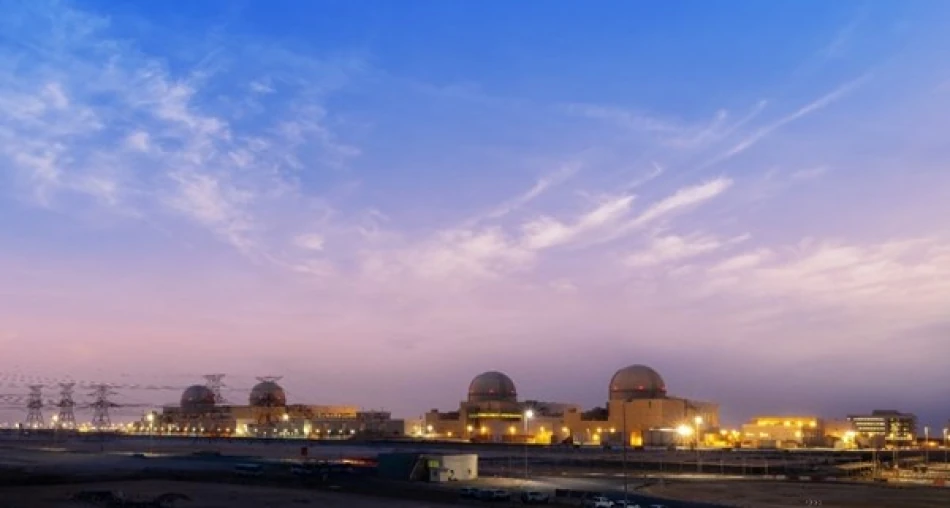
Barakah: A Pioneering Model for Developing Emirati Talent in the Nuclear Energy Sector
UAE's Barakah Nuclear Plant Sets Global Benchmark After One Year of Full Operations
The UAE's Barakah Nuclear Power Plant has emerged as a global exemplar for nuclear energy development, completing one year of full operations across all four reactors while demonstrating that large-scale nuclear projects can be delivered on time and within budget. The achievement positions the Emirates as a regional leader in clean energy and provides a replicable model for countries pursuing nuclear power programs worldwide.
Breaking Nuclear Development Paradigms
Barakah's success story stands in stark contrast to the troubled nuclear projects that have plagued the industry globally. While projects like the UK's Hinkley Point C face massive cost overruns and delays, and similar challenges have affected plants in Finland and the United States, Barakah completed construction and achieved commercial operations according to its original timeline.
The plant now supplies 25% of the UAE's electricity needs with zero carbon emissions, making it a cornerstone of the country's energy security strategy. This achievement is particularly significant given the UAE's ambitious net-zero commitments and its position as a major oil producer transitioning toward diversified energy sources.
Human Capital Development as Strategic Asset
The project's most notable achievement may be its human capital development. Over 2,000 Emiratis have participated in developing and operating the plants, creating a substantial pool of nuclear expertise in a region where such skills were previously non-existent.
Engineer Abdullah Al Manhali, Assistant Manager of Units 3 and 4, joined Emirates Nuclear Energy Corporation in 2011 and became the second reactor operations manager after extensive training in the United States and South Korea. His journey from electronics engineering graduate to nuclear operations leader exemplifies the knowledge transfer that has occurred.
"It was exactly like a dream materializing before our eyes," Al Manhali recalls of the first unit's commercial operation. "At that moment, our nation joined the club of nuclear operating countries and solidified its pioneering position in the global clean energy sector."
Operational Excellence Through Systematic Learning
Engineer Saif Al Ketbi, Senior Manager of Operations, was among the first Emiratis to receive reactor operations manager licenses from the Federal Authority for Nuclear Regulation. He emphasizes how lessons learned from each unit's commissioning improved the next unit's development process, reducing both time and costs.
This iterative improvement approach represents a sophisticated project management methodology that other nuclear programs could emulate. The ability to apply real-time learning across multiple identical units provided Barakah with unique advantages that single-reactor projects cannot achieve.
Market and Geopolitical Implications
Barakah's success carries significant implications for global nuclear markets and regional energy dynamics. The plant demonstrates that nuclear power can be successfully deployed in challenging environments, potentially encouraging other Gulf states to pursue similar programs.
From an investor perspective, the project validates the economic viability of nuclear power when executed efficiently. The UAE's approach—partnering with experienced South Korean contractors while building domestic capabilities—offers a template for emerging nuclear markets.
Regional Energy Leadership
The UAE's nuclear achievement complements its broader clean energy strategy, which includes massive solar installations and hydrogen production initiatives. This diversified approach positions the Emirates as a regional clean energy hub, potentially transforming its role from hydrocarbon exporter to clean energy technology leader.
Construction began in July 2012, with the fourth unit starting construction in 2015. At its peak, Barakah became the world's largest nuclear construction site, with four identical units being built simultaneously—a logistical achievement that contributed to cost efficiencies and knowledge sharing.
Global Nuclear Renaissance Catalyst
Barakah's success arrives at a crucial moment for global nuclear power. As countries seek reliable clean energy sources to meet climate commitments, the UAE has provided proof that nuclear projects can be executed successfully in the modern era.
The project's completion in December 2023, with the fourth unit entering commercial operation in September 2024, establishes new benchmarks for nuclear project delivery. This timeline achievement is particularly valuable as evidence for policymakers and investors evaluating nuclear power's role in decarbonization strategies.
The plant's operational success, combined with its human capital development achievements, suggests that the UAE has not merely imported nuclear technology but has built sustainable capabilities that could support future regional nuclear development or even technology export opportunities.
Most Viewed News

 Layla Al Mansoori
Layla Al Mansoori






